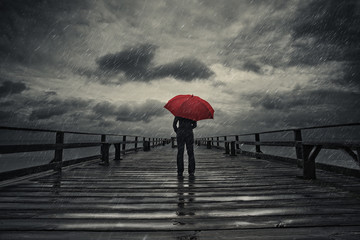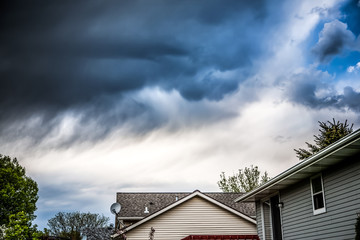Table of Contents

When a storm occurs, your property may be damaged and you’ll need to assess the extent of the damage. Before you do, you must first make sure your home is safe to enter — check for structural damage, loose wiring, gas leaks, and flooding. While inspecting your home, document the damages by taking photos or videos; they will be a critical part of your insurance claim. Even when the storm has passed, keep a hand crank or battery-powered radio, as well as spare batteries, and tune in to the NOAA radio station for weather updates. The nationwide station listing can be found at http://www.nws.noaa.gov/nwr/coverage/station_listing.html
Call your insurance agent as soon as possible. Don’t throw out any damaged property until your insurance agent has inspected it. Here’s how to safely check and handle the damages in your home after a storm:
Check Roofing for storm damage

• Look for missing or broken shingles. However, don’t go on the roof yourself because it’s extremely dangerous, especially after a storm. Have a professional contractor examine and repair your roof.
• If roof repairs are necessary, it might take a while. Have it fixed temporarily to stop rainwater from coming in until a permanent solution can be arranged.
• Use a tarp as an emergency roof covering solution. Cover the damaged area(s) with a woven plastic tarp, holding it in place with 2×4 wood strips.
Electricity

• Turn off your electricity, and disconnect appliances. Check appliances for damaged wires and watch for sparks.
• How to turn off your electricity:
• Locate the main circuit box that’s usually mounted on a wall, typically in the basement. If it’s safe to enter your basement, make sure to bring a flashlight.
• Inside the panel, you will see multiple switches. Turn off the main switch to shut off all electricity in your home. Going into a flooded basement can be dangerous, so it’s best to let a professional handle this.
• If you see frayed electrical wiring or sparks, call an electrician as soon as possible.
• Exterior breaker boxes may not withstand a major storm. If you suspect water has infiltrated the box, call an electrician before turning on the power.
• Avoid metal fences and other metal objects as they may be electrically charged by nearby downed lines.
• If a limb or tree has fallen on a power line near your house, or it touches your property, turn off the power and call the utility company.
• When power returns to your home, don’t start all major appliances at once. Turn them on gradually to prevent damage to sensitive equipment.
Gas Lines

• Leave immediately if you smell fumes or gas, and notify emergency personnel.
• Don’t use matches and candles in your home until all gas lines are checked for leaks. Use battery-powered flashlights to prevent accidental fires.
• Never use an electric generator indoors. Exhaust fumes contain high levels of carbon monoxide which can be deadly if inhaled. Keep generators outside, at least 10 feet away from
your home and away from doors and windows.
Plumbing

• Check the pipes inside and outside your home. If your pipes are damaged, locate the master valve and shut off the water.
• If sewage is backing up in the bathroom or basement, your main sewer line might be clogged or broken. In this case, stop using sinks and toilets, and contact a plumber for assistance.
• If your home or neighborhood was flooded, your water supply might be contaminated. Avoid using tap water for drinking, cooking or washing. If you must, boil the tap water first.
Flood Clean-Up
Flood clean-up is a complicated process that requires specialized knowledge and equipment, such as low-grain refrigerant dehumidifiers and high-capacity air movers. It involves moisture level reading, water extraction, drying, and dehumidification. For water damage repair, your best plan is to hire a professional restoration company that can quickly and efficiently perform the job. Remember that emergency water and fire damage restoration requires urgency and skill. Our PuroClean professionals are highly trained in property damage restoration and respond immediately to minimize the impact of the loss.

There’s always a chance that water could cause damage in your home that untreated could lead to secondary damages. It’s important to know who to call in your time of need. If you are experiencing water damage after a storm, contact us at 843-972-4200. Dealing with any type of loss can be overwhelming and stressful, however you don’t have to do it alone!





 PuroClean Disaster Restoration Specialists of Charleston
PuroClean Disaster Restoration Specialists of Charleston